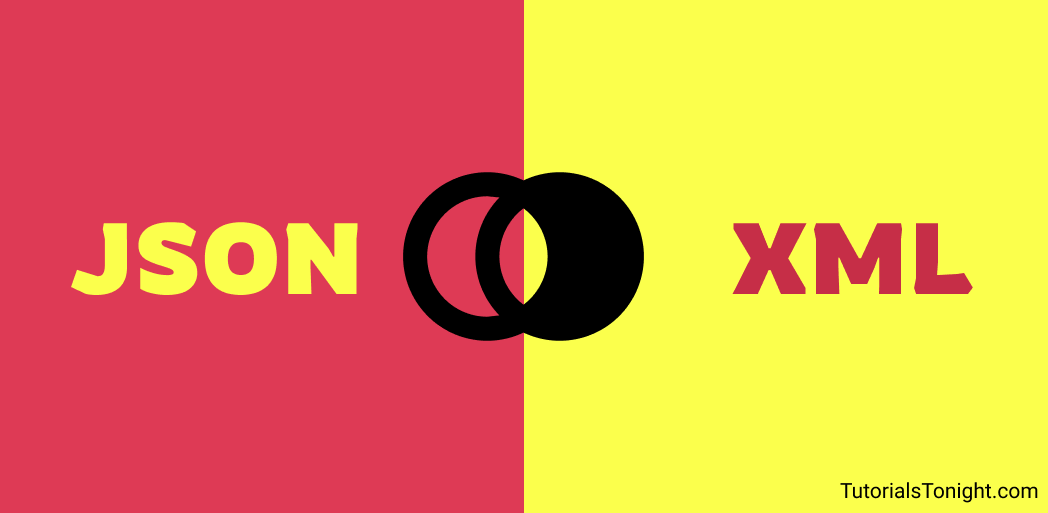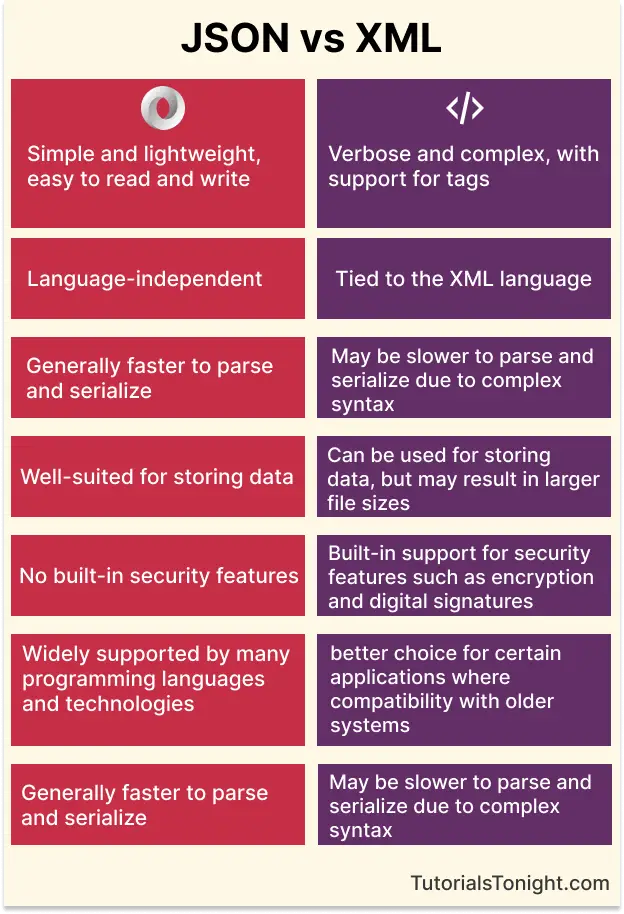JSON vs XML (Comparision)
When it comes to data exchange, there are several formats available. Two of the most popular formats are JSON and XML.
Both of these formats are used to store and transport data. In this tutorial, we will learn about the difference between JSON and XML.

What is JSON?
JSON is a lightweight data-interchange format. It is used to store and transmit data.
Here is an example of JSON data:
{
"name": "John",
"age": 30,
"cars": [
{ "name":"Ford", "models":[ "Fiesta", "Focus", "Mustang" ] }
]
}JSON is completely language independent. It is easy for humans to read and write.
What is XML?
XML is a markup language much like HTML. Just like JSON, it is used to store and transport data.
Here is an example of XML data:
<?xml version="1.0" encoding="UTF-8"?>
<name>John</name>
<age>30</age>
<cars>
<car>
<name>Ford</name>
<models>
<model>Fiesta</model>
<model>Focus</model>
<model>Mustang</model>
</models>
</car>
</cars>Difference Between JSON and XML
Let's now compare JSON and XML on the basis of multiple parameters.
| Feature | JSON | XML |
|---|---|---|
| Human readability | Simple, easy to read and understand | Verbose, more difficult to read and understand |
| Data format | Key-value pairs. Values may be strings, numbers, objects, arrays, true, false, or null | Tagged data. Tags may contain attributes and text |
| Lightweight | Lightweight, simple text-based format | Verbose, more complex syntax |
| Language dependency | Language-independent | Tied to the XML language |
| Parsing | JSON parsers are available for most programming languages and is easy to parse | XML can be more difficult to parse, depending on the programming language you are using. Some languages have built-in support for parsing XML, while others may require the use of additional libraries or frameworks. |
| Speed | Generally faster to parse and serialize | May be slower to parse and serialize due to complex syntax |
| Storage | Well-suited for storing data | Can be used for storing data, but may result in larger file sizes |
| Security | No built-in security features | Built-in support for security features such as encryption and digital signatures |
JSON vs XML Example
Let's take a look at an example of JSON and XML data to see how they compare.
Let's say we want to store information about a person, such as their name, age, and address.
- JSON
- XML
{
"name": "John Smith",
"age": 35,
"address": {
"street": "123 Main Street",
"city": "New York",
"state": "NY"
}
}<person>
<name>John Smith</name>
<age>35</age>
<address>
<street>123 Main Street</street>
<city>New York</city>
<state>NY</state>
</address>
</person>As you can see, the JSON data are very similar and cleaner. Both formats store data in a hierarchical structure, and JSON use key while XML uses tags to identify the type of data that is stored.
JSON vs XML: Performance
When it comes to performance, JSON is generally faster to parse and serialize than XML. This is because JSON is a lightweight, text-based format, while XML is a more complex syntax.
However, the performance difference between JSON and XML can vary depending on the specific implementation and use case. The performance of XML can be improved by using a binary format such as BSON or MessagePack.
Overall, JSON is generally considered to have better performance compared to XML, but it is important to carefully evaluate the specific requirements of your application before making a decision.
JSON vs XML: Which is Better?
It is not accurate to say that one format is inherently "better" than the other, as the appropriateness of a particular data interchange format depends on the specific needs and requirements of the application.
Both JSON and XML have their own strengths and weaknesses, and the appropriate choice for a given application will depend on the specific context and use case.
Here is Google trends data for the search terms "JSON vs XML" over the past 5 years:
JSON vs XML: Which Should You Use?
As mentioned above, the appropriate choice for a given application will depend on the specific context and use case.
Here are some of the factors that you should consider when deciding which format to use:
- Do you need to store data? If so, JSON is generally a better choice, as it is well-suited for storing data.
- Do you need to support multiple programming languages? If so, JSON is generally a better choice, as it is supported by most programming languages.
- Do you need to support security features such as encryption and digital signatures? If so, XML is generally a better choice, as it has built-in support for these features.
- Do you need to support binary data? If so, XML is generally a better choice, as it has built-in support for binary data.
Note: The above list is not exhaustive, both JSON and XML have their own strengths and weaknesses, and the appropriate choice for a given application will depend on the specific context and use case.
JSON vs XML: Summary

